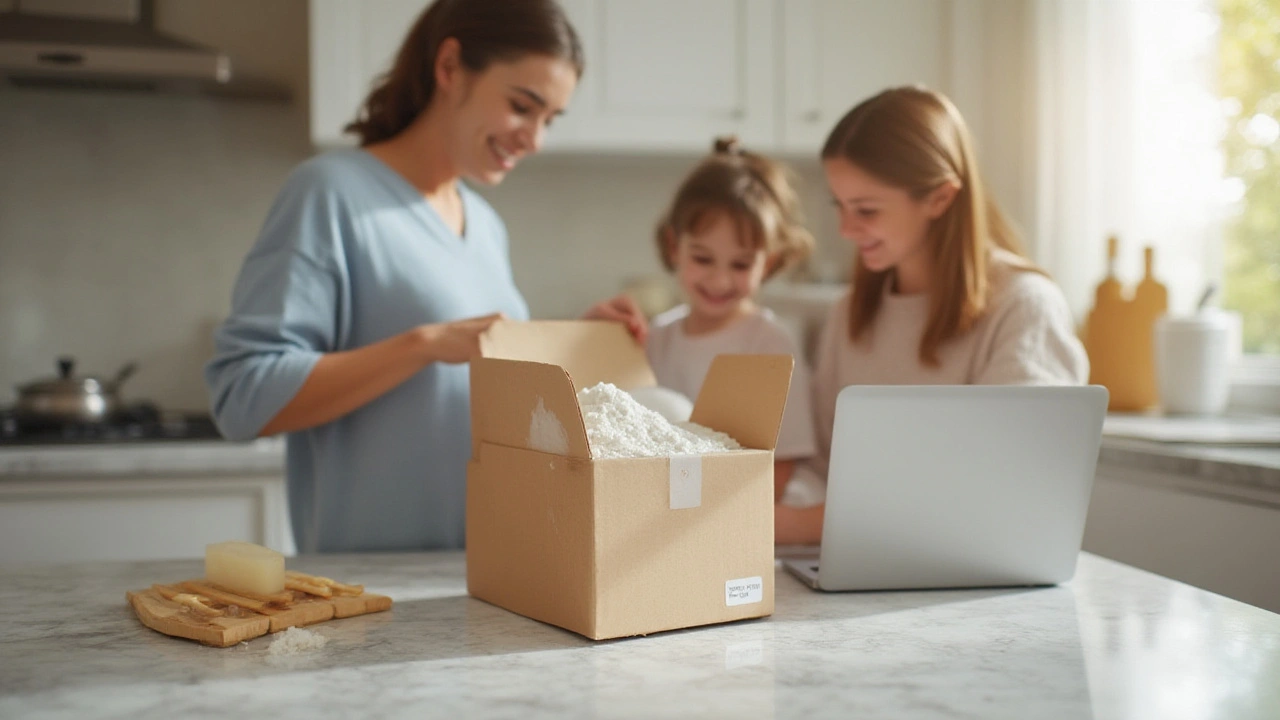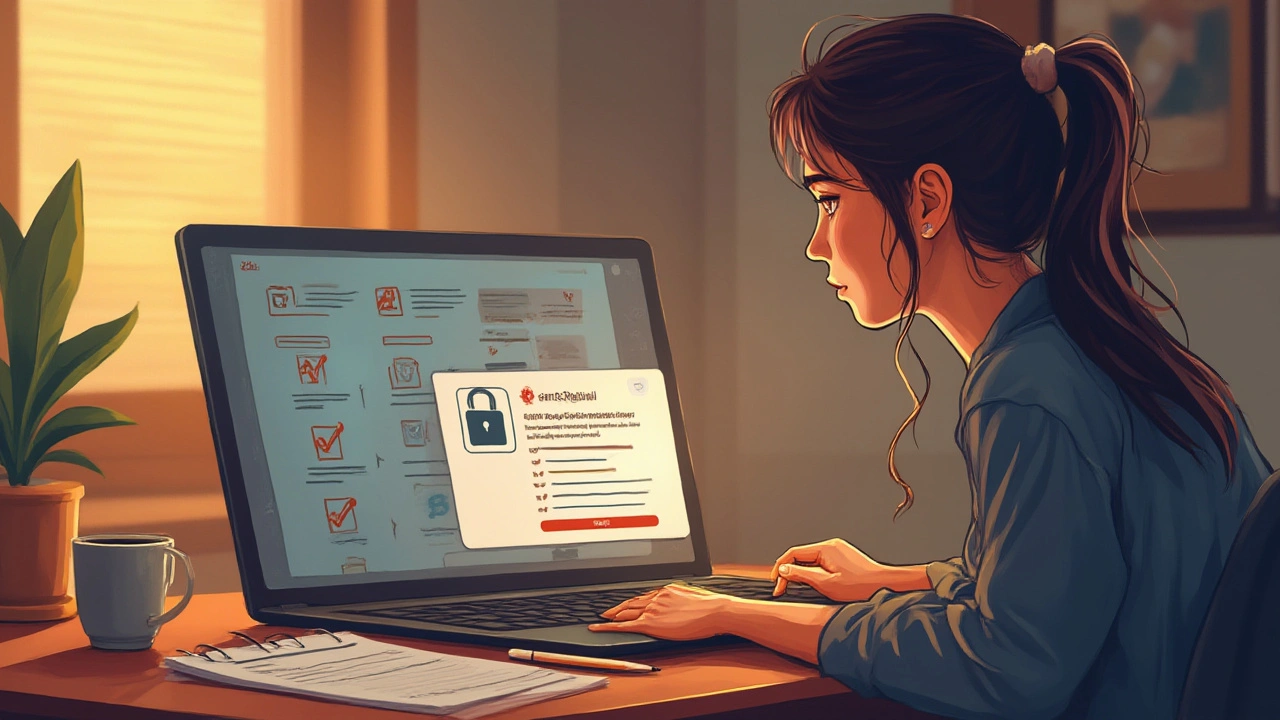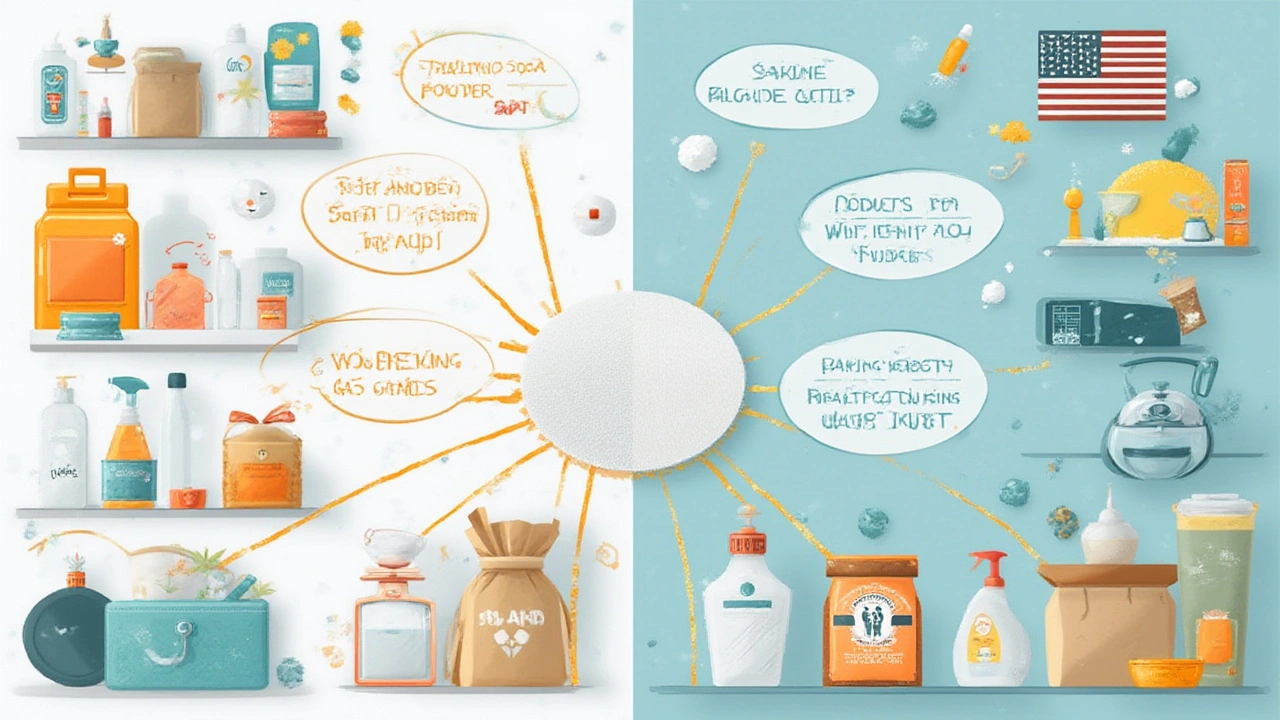Where and How to Buy Sodium Bicarbonate Online Safely in 2025

Think the white powder in your kitchen cupboard is just for baking? Think again. Sodium bicarbonate, or baking soda, is the secret hero behind everything from sparkling teeth to fresher fridges and cleaner laundry. But as more people hunt for it online for health, cleaning, or even beauty fixes, the market’s flooded with confusing options and sketchy sellers. If you’ve ever wondered whether that online deal is legit or what to check before you click ‘Add to Cart,’ here’s your no-nonsense guide.
What Exactly is Sodium Bicarbonate and Why Do So Many People Want It?
Sodium bicarbonate isn’t some fancy compound made for scientists and chemists alone. You probably used it last week for baking or maybe to scrub away stubborn tea stains. Chemically, it’s a salt made from sodium and bicarbonate ions. When you mix it with acid, you see fizz—think of those DIY volcanoes in school. Behind those bubbles, there’s real power. Sodium bicarbonate is mildly alkaline, helping balance acids and neutralize odors. That's why it's in toothpaste, antacids, cleaning sprays, and even in some first aid kits.
People turn to it for headaches, heartburn, and even athletic performance, though there’s debate about how effective it really is for some of those uses. The World Health Organization keeps it on their List of Essential Medicines, showing how valued it is. When it comes to household uses, between 2021 and 2024, online searches for “baking soda hacks” tripled, especially during pandemic lockdowns—everyone was baking, cleaning, and trying DIY remedies. It's so safe and handy that an average Irish household goes through at least 2 kilos a year, much of it bought online these days.
Strangely enough, sodium bicarbonate stocks even faced shortages in 2023 when TikTok trends around ‘natural cleaning’ and ‘whitening hacks’ caused a surge in demand. It’s more than just hype—this powder is a backstage workhorse. Knowing what you’re looking for helps you avoid paying too much, getting scammed, or purchasing an inferior product filled with fillers or contaminants.
Spotting Quality Sodium Bicarbonate from Online Sellers
Buying sodium bicarbonate online is easier than ever, but the explosion of new shops and sellers has made things more complicated. Your goal? Avoid products that are cut with other substances, have poor packaging, or make wild health claims. It’s easy to think that all sodium bicarbonate is the same, but there are clear distinctions between food-grade, pharmaceutical grade, and industrial grade powders.
If you want sodium bicarbonate for cooking or brushing your teeth, always look for ‘food-grade’ or ‘USP’ (United States Pharmacopeia) labels, as these meet rigorous safety standards. Industrial versions sometimes have impurities that are fine for cleaning but not for eating. Some online stores mislabel grades to hike their prices. Watch out for listings that promise miracle cures, too. The main red flag? If the shop has little information about the source, or reviews mention strange smells or textures, skip it.
Decent sellers always provide a detailed ingredient list, proper contact information, and clear storage directions. It’s worth checking their customer reviews, not just for the product but also for questions about delivery times and customer service. When in doubt, check for a trusted certification. In Ireland, the Food Safety Authority’s website lists safe suppliers and product alerts. Buying in bulk? Some shops have minimum order amounts, so calculate what you really need. Remember: sealed packaging protects freshness and stops the powder from clumping or picking up odors in transit.

Best Places to Buy Sodium Bicarbonate Online in 2025
People hunt for sodium bicarbonate on every corner of the web—Amazon, pharmacies, niche eco-shops, or even agricultural supply outlets. Where you buy really depends on what you plan to do with the powder. Supermarkets like Tesco, Dunnes, and Sainsbury’s still offer it online, mostly as baking soda packets or cleaning powders. For those keen on the “health” angle—like antacid tablets or pure powder for home remedies—online chemists such as Boots or McCabe’s Pharmacy are some of the safest bets.
Amazon and eBay come loaded with options, but you have to wade through plenty of private sellers or overseas listings. Tip: always choose sellers with established reviews over pop-up listings with too-good-to-be-true prices. In 2024, Amazon UK reported that over 70% of their sodium bicarbonate sales in Ireland were to repeat buyers, showing that people stick to brands they trust. There are also Irish-based eco-friendly stores like the “Minimal Waste Grocery” that sell sodium bicarbonate in bulk with sustainable packaging—sometimes with free local delivery in Dublin.
You can find specialty shops online that sell pharmaceutical-grade sodium bicarbonate or larger packs for making your own cleaning products. Pharmacy websites often require age verification or a quick chat with a pharmacist online if you’re buying for heartburn or kidney care. Watch out: some sellers try to pass off industrial powder as suitable for personal use, but that’s a gamble. Stick to health or cooking sites for anything that’s going near your mouth or skin. Here’s a little cheat sheet of places and what they offer:
| Seller Type | Best For | Highlight |
|---|---|---|
| National Supermarkets | Baking, Cleaning | Known brands, food safe |
| Online Pharmacies | Antacids, Remedies | Pharmaceutical grade |
| Amazon/eBay | Bulk, Specialty | Multiple brands, reviews |
| Zero-Waste/Green Shops | Eco-Packaging, Bulk | Local, sustainable |
| Agricultural Stores | Garden/Cleaning | Large drums, lower grade |
Biggest buying tip? Never use industrial grade for food or personal care. Some of it is specifically marked for de-icing or cleaning drains—it’s too rough for your teeth or stomach, trust me.
Tips for Safe Online Buying and Avoiding Common Pitfalls
The rush for online sodium bicarbonate brings out the best and worst sellers. One quick scan through Reddit or Trustpilot shows wild stories—orders that never arrive, powder that smells off, or brands sneaking in filler like chalk. That’s why it pays to be cautious, not just lucky. Rule number one: pay attention to packaging details. Well-sealed, resealable packs keep your powder dry, and trustworthy sellers even mention batch numbers and expiration dates.
Read customer reviews, but go deeper than the star rating. Look for photos included by buyers, or details about how the product performed. If you see reviews that sound too generic—"great, would buy again"—and nothing about the actual product, be wary. Watch for shipping policies: if the seller is based outside the EU, you might be hit with surprise customs fees, or the shipping may take longer than expected. During supply chain hiccups in 2023, some buyers waited up to eight weeks for a simple box of powder from the US or China.
If price per kilo looks way lower than other sellers, double-check the grade and the reviews. Scams often lure folks in with bargain prices. Credit card payments or PayPal usually give you better purchase protection than wire transfer. After you get your package, open it right away and double-check for any unusual odors, colors, or clumping. If anything’s off, don’t use it. Most reputable sites will refund quickly if you share a photo of the problem. And don’t forget—if you’re buying for medical use, like homemade antacids or kidney therapies, it’s essential to run it by your doctor or pharmacist first.
- Only buy food or USP/Pharma-grade for personal care and cooking.
- Avoid "miracle cure" claims – sodium bicarbonate is helpful but not magic.
- Calculate realistic quantities; powder keeps about two years when stored well.
- Eco-refills from local shops reduce plastic waste and support small Irish businesses.
- Check policies on returns and refunds before you order, especially from international sellers.

How People Use Sodium Bicarbonate in Health, Home, and Beyond
Sodium bicarbonate is the multitool of the everyday world. Yes, it bakes fluffy cakes, but it’s also a gentle abrasive for whitening teeth, a deodorizer for shoes and fridges, and a lifesaver for accidental acid splashes. Dental pros across Ireland recommend it in moderation for stain removal. Meanwhile, chemists use it as an antacid to help people with mild heartburn—one little half-teaspoon can ease acid quickly, though it’s best not to overdo it without a doctor’s go-ahead.
Beyond health, everyone seems to have a secret baking soda trick. Gardeners use it to balance soil pH, while parents add a scoop to the laundry to keep clothes fresh and soft. If you check cleaning forums, you’ll spot endless tips: unblocking sinks, neutralizing pet accidents, or freshening up carpets. In sports, some marathon runners mix it with water to try to delay lactic acid build-up. While limited studies show some minor benefits, the effect is usually small—and gulping loads of sodium bicarbonate is a fast track to an upset stomach. In fact, the European Food Safety Authority advises keeping daily intake under 5 grams to avoid electrolyte problems.
Artists even use it for fizzing paint effects, and science lovers can’t get enough of clay volcano demonstrations. If you spill battery acid, you’re told to pour sodium bicarbonate for instant neutralization. Emergency services keep it on hand for certain poisonings (but that’s a job for professionals!). Some eco-warriors swap harsh drain cleaners for a baking soda and vinegar combo, giving a chemical reaction without commercial pollutants. Just be careful—this combo can push blockages further down the pipe if you use too much.
With so many uses, it’s easy to get enthusiastic, but a little goes a long way. Double-check measurements for recipes, and never use random powder from the shed in your biscuits. Store extra sodium bicarbonate in a dry, cool cupboard, ideally in an airtight box. In one survey in 2024, 82% of Irish households used sodium bicarbonate weekly—mostly for cleaning and laundry, not just cooking. There's a reason this powder's never out of style.

John Barton
July 18, 2025 AT 16:26Oh wow, buying sodium bicarbonate in 2025? What a rollercoaster of a future topic.
Seriously though, does anyone actually think there will be a secret handshake or some cryptic password needed to buy baking soda in a few years? I'd imagine it's as simple as ordering any other pantry staple online today.
But then again, maybe 2025 is the year we all have to prove we're worthy of bicarbonate or something. Honestly, the legal points bit intrigues me. Are there going to be regulations slapped on this common household item? I doubt it, but I'm all ears if someone knows otherwise.
I'm curious, anyone got funny or weird stories about trying to buy this kind of stuff online? Sometimes the simplest things become a hassle thanks to shipping errors or mislabelling.
Anyway, props for the post that highlights safety and legit online sources. Feels like a guide for something way more high-stakes than it probably is.
Antara Kumar
July 18, 2025 AT 18:39I don’t get the hype around just buying sodium bicarbonate online. Here in India, you can walk into any store and get it without this so-called "legal complexity."
The post tends to overcomplicate a very simple product. Why are we trying to make this a big deal? It’s basic chemistry, accessible and cheap.
Online buying is convenient but in some places, the in-person approach is still unmatched for trust and safety. Don’t get me wrong, safety is important, but this sounds like unnecessary fear-mongering about a common household item.
If you’re worried about authenticity, maybe just stick to trusted local shops rather than hunting it down on the internet where regulation often falls apart.
We should focus more on educating people about the uses and benefits rather than creating a complicated buying process.
Lilly Merrill
July 18, 2025 AT 21:59This post definitely touches on some helpful points about safety and legal considerations when buying simple chemicals online. While some may see sodium bicarbonate as mundane, the reality is that quality and source do matter.
From a cultural perspective, it’s interesting how digital shopping shapes our interaction with everyday products. Even something as common as baking soda gains a new layer of significance when online markets and potential counterfeit risks come into play.
I appreciate the reminder about legal points too. Different countries might treat these substances differently, so it’s good for people to be aware before ordering internationally.
Also, sodium bicarbonate has so many uses—from cooking to health remedies. It's nice to have a trustworthy resource guiding us on where to get quality product safely in the future.
Overall, it’s a valuable read with practical advice that applies across cultures.
Charlie Martin
July 19, 2025 AT 04:06Can we talk about how many of us just grab baking soda off the shelf without a second thought? This post reminds me that careful buying online should be taken seriously.
It makes me wonder about the quality control online sellers have over such basic chemicals. Are we really sure what’s inside the packets we order from random websites?
Also, the legal bit makes me think: are we heading to a world where even the simplest household goods need extensive documentation? That kind of overregulation could be a nightmare.
In practice, I’d recommend checking reviews meticulously and sticking to recognized brands. It might cost a bit more, but peace of mind is worth it.
Does anyone else here have horror stories about receiving low-quality or mislabeled sodium bicarbonate from online sellers? Would love to hear.
Edward Leger
July 19, 2025 AT 06:36Reflecting on sodium bicarbonate's role both practically and philosophically, it's funny how a simple compound holds so many layers of meaning in our daily lives.
From my viewpoint, safety when purchasing online relates not only to physical health but to trusting the integrity of the supply chain, which mirrors trust in broader societal structures.
Understanding legal points hints at the complex web of governance that even simple household items are subject to, subtly shaping consumer freedom.
This post invites us to pause and consider how we engage with everyday materials in the digital age—how ease of access combines with responsibility to create new dynamics in our consumer relationships.
It's intriguing to think about how even baking soda embodies intersections of science, law, culture, and personal agency.
Kimberly :)
July 19, 2025 AT 14:56Honestly, I doubt there's much difference in quality buying sodium bicarbonate online versus in stores but yes, safety considerations are important to highlight. 🙂
Also, those legal points could differ widely from country to country, so anyone ordering internationally should be extra careful.
I'm curious if this trend of buying such basics online will affect the brands that traditionally dominated the market, like Arm & Hammer.
Some people might go for cheaper, less reliable products from lesser-known sellers, which can risk contamination or poor effectiveness.
In any event, I think this post is a good heads-up for people not to be complacent just because something seems plain and easy to get.
Kathy Butterfield
July 19, 2025 AT 17:26From a casual perspective, buying sodium bicarbonate online is super convenient and usually safe if you pick a reliable seller. 😊
I use it for cleaning, baking, and even some skin care hacks. Having honest vendors online is great because you can get bulk quantities at better prices.
But yeah, it's important to watch out for those 'legal' dust-ups because sometimes sellers skimp on labeling or certifications.
It’s awesome to see more posts educating people on purchasing essentials safely in 2025 as the online marketplace just keeps growing bigger and more complicated.
Has anyone tried any non-traditional brands online? How did they perform compared to classic brands you find offline?
Richard Wieland
July 19, 2025 AT 19:22It seems logical that buying any chemical substance online demands attention to authenticity and safety.
One must consider the seller's reputation, product reviews, and transparency about sourcing.
The legal aspects can be murky, especially when crossing borders, so knowing your local laws is crucial.
For something as ubiquitous as sodium bicarbonate, we sometimes overlook these nuances, but the risks of contamination or mislabeled products underscore the need for vigilance.
Purchasing from certified or well-known retailers tends to minimize such risks.
Deborah Escobedo
July 20, 2025 AT 02:52I appreciate this post making it clear that sodium bicarbonate is more than just a kitchen staple—it has genuine health and household uses requiring trusted sources.
Safety while buying is often overlooked, so mentioning real uses and legal considerations encourages responsible shopping.
If you’re using this for health purposes, the quality of the product directly affects effectiveness and safety.
I'd advise checking if the seller provides detailed product info and third-party testing documentation if available.
Let’s promote awareness about safely sourcing even everyday chemicals so everyone benefits.
Dipankar Kumar Mitra
July 20, 2025 AT 19:16Coming from India, it’s interesting to see how this topic is framed from a mostly western perspective. Online buying does offer convenience but also risks people become careless regarding quality.
Many underestimate the importance of verifying the source especially with chemicals that impact health when used directly or on skin.
Legal points vary widely, and strict regulations in some countries make ordering such substances abroad tough or risky.
I think the post should have stressed a bit more about educating buyers on reading ingredient lists and understanding product certifications rather than just where to buy.
Still, it’s a decent starter for people wanting to be more cautious in the evolving online market of 2025.
Tracy Daniels
July 21, 2025 AT 01:57Thank you for this great post! It really helps to understand the importance of buying sodium bicarbonate from trustworthy online sellers.
Being inclusive in making sure everyone can access safe information about our daily essentials is so important. :)
I've noticed many people don't realize how variations in quality can affect both cooking outcomes and health uses.
It's also encouraging to see awareness about legal issues so consumers aren't caught off guard by import restrictions or unsafe products.
If you’re new to buying this online, I’d recommend starting with popular platforms and brands with good feedback to build confidence.